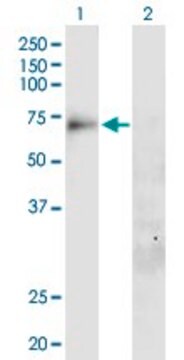MABT1331
Anti-ADAM 12 Antibody, clone 6E6
clone 6E6, from mouse
Sinônimo(s):
Disintegrin and metalloproteinase domain-containing protein 12, Meltrin-alpha
About This Item
Produtos recomendados
fonte biológica
mouse
forma do anticorpo
purified immunoglobulin
tipo de produto de anticorpo
primary antibodies
clone
6E6, monoclonal
reatividade de espécies
human
embalagem
antibody small pack of 25 μg
técnica(s)
flow cytometry: suitable
immunocytochemistry: suitable
immunoprecipitation (IP): suitable
western blot: suitable
Isotipo
IgG1κ
nº de adesão NCBI
nº de adesão UniProt
modificação pós-traducional do alvo
unmodified
Informações sobre genes
human ... ADAM12(8038)
Categorias relacionadas
Descrição geral
Especificidade
Imunogênio
Aplicação
Western Blotting Analysis: A representative lot detected ADAM 12 in Western Blotting applications.
Immunoprecipitation Analysis: A representative lot immunoprecipitated ADAM 12 in Immunoprecipitation applications.
Immunocytochemistry Analysis: A representative lot detected ADAM 12 in Immunocytochemistry applications.
Flow Cytometry Analysis: A representative lot detected ADAM 12 in Flow cytometry applications.
Apoptosis & Cancer
Qualidade
Immunocytochemistry Analysis: A 1:250 dilution of this antibody detected ADAM 12-DeltaCyt in MCF-7 cells.
Descrição-alvo
forma física
Armazenamento e estabilidade
Outras notas
Exoneração de responsabilidade
Não está encontrando o produto certo?
Experimente o nosso Ferramenta de seleção de produtos.
Certificados de análise (COA)
Busque Certificados de análise (COA) digitando o Número do Lote do produto. Os números de lote e remessa podem ser encontrados no rótulo de um produto após a palavra “Lot” ou “Batch”.
Já possui este produto?
Encontre a documentação dos produtos que você adquiriu recentemente na biblioteca de documentos.
Nossa equipe de cientistas tem experiência em todas as áreas de pesquisa, incluindo Life Sciences, ciência de materiais, síntese química, cromatografia, química analítica e muitas outras.
Entre em contato com a assistência técnica